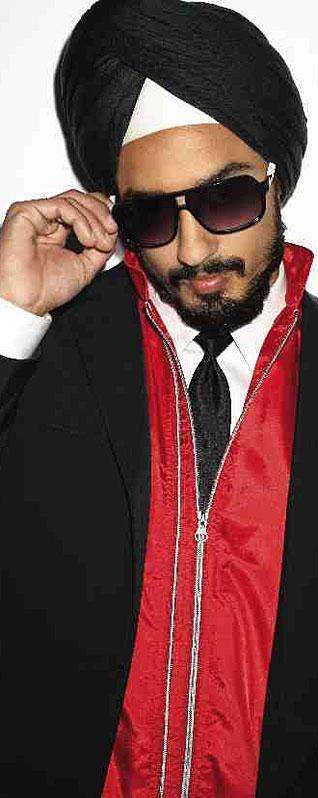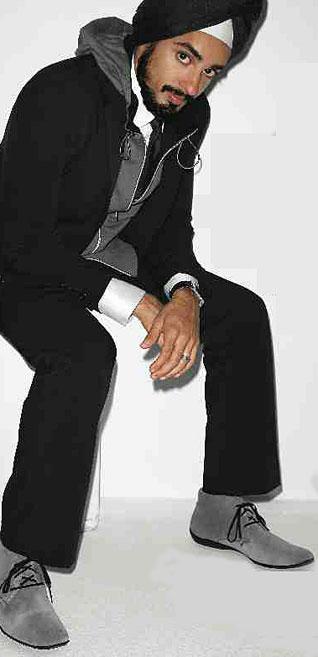Fashion
Sleek Sikh
by Julia Duin
Seven years ago, sporting a Sikh turban could get you killed, as was Balbir Singh Sodhi, a gas station owner who was shot September 15, 2001 in Mesa, Arizona, U.S.A., after his murderer mistook him for a Muslim.
Today, the trademark head-covering sported by male members of the Sikh religion can get you into the heights of mens' fashion.
Such is what happened to Sandeep Singh "Sonny" Caberwal, 29, a graduate of Duke University and Georgetown Law School who, on a whim, it seems, decided to take on a most unusual assignment: modeling men's clothing to make a point about diversity.
Sandeep Singh, shown in photos accompanying this column, grew up in rural Ashboro, North Carolina. as the son of a doctor and the wearer of a turban, ever since he was a small child. His family is from Punjab, India.
He has never cut his hair, as all Sikhs have been required to keep their hair unshorn since 1699. For males, it is always covered by a turban or a similar headdress.
Some time ago - he does not know when - Kenneth Cole, founder of a clothing line by the same name, got an idea for an advertising campaign on breaking stereotypes, while plugging clothing.
Mr. Cole hired a casting agency to find a male Sikh willing to be a model. The man had to be American-born, highly educated and articulate. There being no candidates on the usual lists, the agency began calling up national Sikh-rights organizations and Sandeep heard Cole was looking.
One thing led to another and last October, he found himself in New York posing in some pretty spiffy clothes along with that turban.
"People think Sikhs are fundamentalist, outside the mainstream of society, or immigrants or something is wrong with them", Sandeep said in a visit to my office recently.
"Kenneth Cole wanted to represent the fabric of American culture. There's a lot of struggle in the United States as to how we perceive people post-9/11. I am as much American as anyone else".
Kenneth Cole has a history of provocative advertising, running ads promoting everything from AIDS awareness to helping end homelessness. He designed T-shirts for World AIDS Day in 2005 and announced in 2006 he would stop selling fur in his clothing.
His choice of a Sikh to represent an American Everyman has made headlines in newspapers in India, where Sikhs number some 25 million adherents, a drop in the ocean compared with the country's huge Hindu majority. There are about 500,000 Sikhs in the United States.
"I've heard from thousands of people around the world on how they appreciated this", Sandeep said. He hopes his day in the sun will encourage Sikh youth, whose unusual headcovering makes them stand out in a crowd.
"Having a unique identity can be a very lonely road to walk down", the model said. "Fighting against a negative stereotype is consistently tough".
All Sikhs know what it's like to be harassed, he said, and his brother-in-law has endured worse: physical threats, job discrimination and taunts, just for being confused with Muslims.
Kenneth Cole had heard of what Sikhs endure, he said, and wanted to include a Sikh in an ad campaign to introduce the concept that Sikhs are normal folk who wear cool clothes and think like us.
Sandeep flew to Washington last Tuesday to speak at a Sikh-American dinner on Capitol Hill. I told him that I had rarely, if ever, encountered an ad agency that used religion to sell clothes.
We disagreed over whether Kenneth Cole's campaign had anything to do with faith. He said it did not; it was more about a "look" that is exotic, unusual, out-of-the-box now, but that will be the new normal in a more diversified America.
Even if it's just about building a brand, Kenneth Cole is borrowing symbols that are far more complex than a fashion centerfold. And where does it stop? If you use a turbaned Sikh to shock and captivate today, do you employ women in hijabs and men wearing yarmulkehs tomorrow?
Religious clothing makes a statement, as we've seen from the granny-style dresses worn by fundamentalist Mormon women who were part of the west Texas compound raided last month by police and child welfare investigators.
Is there a point at which such clothing, worn for modesty or to express devotion to God, should not be used as a fashion statement, no matter how noble its objectives?
I draw the line at who is doing the modeling. If the model - as was Sandeep Singh - is part of that religion, I've no problem with them wearing distinctive dress. But should that clothing become an accoutrement on a secular wearer, then no, it should not be used for fashion.
In the case of the Sikhs, Sandeep is the first such American model and a groundbreaker in illustrating how Sikhs and other Indians have arrived as part of the American scene.
[Julia Duin is assistant national editor/religion, The Washington Times]
June 13, 2008
Conversation about this article
1: Sarvpreet Singh (India), April 03, 2009, 1:01 PM.
As regards the issue of using religious wear for making fashion statements goes, I am of the opinion that there is nothing wrong per se in doing so. Also, the argument that religious wear should not be worn by people who don't belong to that particular religion is again flawed. The whole point is that there should be acceptance in general for various religious apperances, be it turban, head scarves or even hijabs for that matter. People have to be accepted the way they profess their lifestyles; fashion sterotyping is not a healthy thing and if I find something attractive just because it's unique, there should be no problem in my seeing it as fashion. Of course, the panache with which a person who professes a religion in real life will set him/her apart from the one who does it just for a catwalk. But the whole idea of religious fashion should not be condemned as it gives an opportunity for people of all sorts and kinds to join the mainstream.
2: Rickey (Bihar, India), September 03, 2009, 12:57 AM.
My hobby is modelling.




